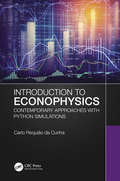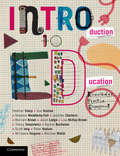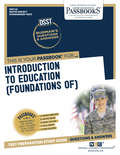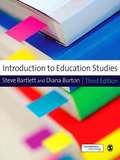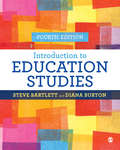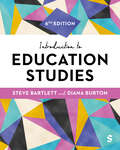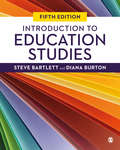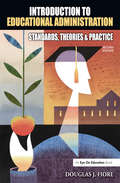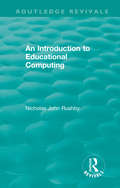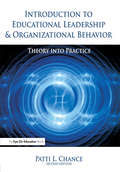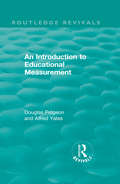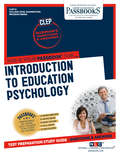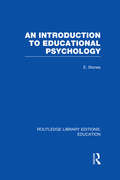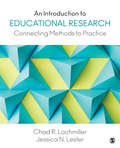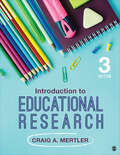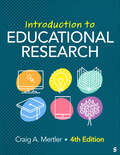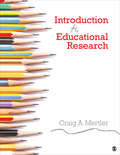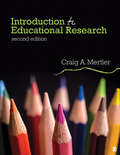- Table View
- List View
Introduction to Econophysics: Contemporary Approaches with Python Simulations
by Carlo Requião da CunhaEconophysics explores the parallels between physics and economics and is an exciting topic that is attracting increasing attention. However there is a lack of literature that explains the topic from a broad perspective. This book introduces advanced undergraduates and graduate students in physics and engineering to the topic from this outlook, and is accompanied by rigorous mathematics which ensures that this will also be a good guide for established researchers in the field as well as researchers from other fields, such as mathematics and statistics, who are interested in the topic. Key features: Presents a multidisciplinary approach that will be of interest to students and researchers from physics, engineering, mathematics, statistics, and other physical sciences Accompanied by Python code with further learning opportunities, available for readers to download from the CRC Press website. Accessible to both students and researchers Carlo R. da Cunha is an associate professor of physics and engineering physics at the Universidade Federal do Rio Grande do Sul (Brazil) and has been since 2011. Dr. da Cunha received his M.Sc. Degree from the West Virginia University in 2001 and his Ph.D. degree from Arizona State University in 2005. He was a postdoctoral researcher at McGill University in Canada in 2006 and an assistant professor of engineering at the University Federal de Santa Catarina between 2007 and 2011. He has been a guest professor at the Technische Universität Wien (Austria), Chiba University (Japan) and Arizona State University (US). His research revolves around the physics of complex systems where he has been drawing parallels between physical and economic systems from quantum to social levels.
Introduction to Education: Knowledge, Practice, Engagement
by Heather Sharp Sue Hudson Noelene Weatherby-Fell Jennifer Charteris Bernard Brown Jason Lodge Lisa McKay-Brown Tracey Sempowicz Rachel Buchanan Scott Imig Peter Hudson Michaela Vergano Michael WalshIntroduction to Education provides pre-service teachers with an overview of the context, craft and practice of teaching in Australian schools as they commence the journey from learner to classroom teacher. Each chapter poses questions about the nature of teaching students, and guides readers though the Australian Professional Standards for Teachers. Incorporating recent research and theoretical literature, Introduction to Education presents a critical consideration of the professional, policy and curriculum contexts of teaching in Australia. The book covers theoretical topics in chapters addressing assessment, planning, safe learning environments, and working with colleagues, families, carers and communities. More practical chapters discuss professional experience and building a career after graduation. Rigorous in conception and practical in scope, Introduction to Education welcomes new educators to the theory and practical elements of teaching, learning, and professional practice.
INTRODUCTION TO EDUCATION: Passbooks Study Guide (DANTES Subject Standardized Tests (DSST) #Dantes-22)
by National Learning CorporationThe DSST Subject Standardized Tests are comprehensive college and graduate level examinations given by the Armed Forces, colleges and graduate schools. These exams enable students to earn college credit for what they have learned through self-study, on the job, or by other non-traditional means. The DSST Introduction to (Foundations of) Education Passbook® prepares candidates for the DSST exam, which enables schools to award credit for knowledge acquired outside the normal classroom environment. It provides a series of informational texts as well as hundreds of questions and answers in the areas that will likely be covered on your upcoming exam, including but not limited to: contemporary issues in education; philosophies, theories and ideologies; social/economic influences; curriculum; and more.
Introduction to Education Studies
by Dr Steve Bartlett Dr Diana M BurtonEducation Studies is a broad, multi-disciplinary and rapidly growing field. Introduction to Education Studies has proven itself to be the key text for students of the subject for over a decade, leading readers through the field's key strands, concepts and applications without assuming any prior knowledge. <P><P> Bartlett and Burton provide first-time students and those engaged in more advanced aspects of the subject with all the tools that they need to approach Education Studies and also encourage a critical, questioning approach which will put them in good stead for further study and professional practice.<P> The new edition includes:<P> * A new chapter on globalisation and international comparative education <P> * A new companion website featuring online journal articles relating to each chapter <P> * More guidance on how to critique research <P> * More 'Reader Reflection' boxes, encouraging students to reflect on their own practice throughout <P> * A new framework for analysing policy <P> * New sections within the curriculum and the history of schooling chapters reflecting the latest UK developments<P> * Complete update of education policy issues <P> Additional online resources at www.uk.sagepub.com/bartlett3e<P> Also available are free journal articles accompanying each chapter of the book, enabling discussion and further reading to deepen students knowlege of each chapter subject.<P> Steve Bartlett is Professor of Education Studies at the University of Wolverhampton.<P> Diana Burton is Professor of Education and Pro Vice Chancellor at Liverpool John Moores University.
Introduction to Education Studies
by Steve Bartlett Diana M BurtonIntroduction to Education Studies has proven itself to be the key text for students of Education Studies for over a decade, leading readers through the field's key ideas, concepts and debates. Drawing from the main educational themes of sociology, philosophy, history, psychology and policy, Bartlett and Burton introduce you to different ways of looking at education and the ideologies that shape educational systems. Tightly supported by accessible links to research literature and keenly aware of contemporary developments, this book encourages you to adopt a critical, questioning approach to your study in order to develop an engaged and informed understanding of education. This new edition includes: A range of video discussion boxes throughout the book and linked to the companion website exploring key issues related to each chapter. Enhanced coverage of special educational needs, discussing how policy has evolved historically and in more recent times throughout the New Labour and Coalition governments. New discussion of the 2014 National Curriculum in England and the political processes and ideologies underpinning it.
Introduction to Education Studies
by Diana M Burton Steve BartlettIntroduction to Education Studies has proven itself to be the key text for students of Education Studies for over a decade, leading readers through the field's key ideas, concepts and debates. Drawing from the main educational themes of sociology, philosophy, history, psychology and policy, Bartlett and Burton introduce you to different ways of looking at education and the ideologies that shape educational systems. Tightly supported by accessible links to research literature and keenly aware of contemporary developments, this book encourages you to adopt a critical, questioning approach to your study in order to develop an engaged and informed understanding of education. This new edition includes: · A range of video discussion boxes throughout the book and linked to the companion website exploring key issues related to each chapter · Enhanced coverage of special educational needs, discussing how policy has evolved historically and in more recent times throughout the New Labour and Coalition governments · New discussion of the 2014 National Curriculum in England and the political processes and ideologies underpinning it
Introduction to Education Studies
by Diana M Burton Steve BartlettIn this fully updated sixth edition of this much-loved textbook, students will be introduced to different ways of looking at education, supported by links to classic and contemporary research. Built around the essential themes of psychology, history, policy and sociology, this new edition explores a range of contemporary topics found on Education studies courses, including: UK education policy since 2020, including policy responses to the COVID-19 pandemic Decolonising the curriculum and social justice Education studies and student employability Expanded coverage of cognitive psychological theories of learning
Introduction to Education Studies
by Diana M Burton Steve BartlettIn this fully updated sixth edition of this much-loved textbook, students will be introduced to different ways of looking at education, supported by links to classic and contemporary research. Built around the essential themes of psychology, history, policy and sociology, this new edition explores a range of contemporary topics found on Education studies courses, including: UK education policy since 2020, including policy responses to the COVID-19 pandemic Decolonising the curriculum and social justice Education studies and student employability Expanded coverage of cognitive psychological theories of learning
Introduction to Education Studies
by Diana M Burton Steve BartlettIn this fully updated fifth edition of this much-loved textbook, you will be introduced to different ways of looking at education, supported by links to classic and contemporary research. Built around the essential themes of psychology, history, policy and sociology that underpin Education Studies courses, key updates include: · New ‘Applying Critical Evaluation’ tasks to help develop your analytical skills · Analysis of recent curriculum developments including EY assessment, Ebacc and T-levels · Examination of education policy up to, and including, 2019 · Enhanced discussion of educational neuroscience and the science of learning
Introduction to Education Studies
by Diana M Burton Steve BartlettIn this fully updated fifth edition of this much-loved textbook, you will be introduced to different ways of looking at education, supported by links to classic and contemporary research. Built around the essential themes of psychology, history, policy and sociology that underpin Education Studies courses, key updates include: · New ‘Applying Critical Evaluation’ tasks to help develop your analytical skills · Analysis of recent curriculum developments including EY assessment, Ebacc and T-levels · Examination of education policy up to, and including, 2019 · Enhanced discussion of educational neuroscience and the science of learning
Introduction to Educational Administration: Standards, Theories, and Practice
by Douglas FioreOrganized around the ISLLC standards, this text introduces students to the concepts and theories of educational leadership. The new edition adds coverage of such topics as data usage, ethics, innovative hiring practices, and student discipline. Appearing in the second edition are chapter-ending sections called “Point-Counterpoint” which prompt readers to examine their own beliefs regarding the material presented in the chapter and its application to work in our schools.
An Introduction to Educational Computing (Routledge Revivals)
by Nicholas John RushbyIn both education and training, teachers are faced with many and varied problems relating to their teaching and their students’ learning. Educational technology, in its widest sense, provides teachers with methods and tools which, if properly used, can alleviate some of these problems. The computer is one such tool, offering, within certain limitations, some possible solutions. Originally published in 1979, this book describes the use of the computer as a resource and as a manager in education and training. It discusses the use, potential and limitations of this technology in helping the teacher and trainer. Beginning with a consideration of the role of the computer as a mediator in the flow of information between the student and his learning environment, the book goes on to look at Computer Assisted Learning from an educational viewpoint, the strength and weaknesses of a number of different media, and the problems of managing modular courses and course structures and handling information on students’ performance and progress. A chapter on informatics and education addresses the problem of what both teachers and students should know about computers, while the final chapter examines the practical problems of prompting and organising the appropriate use of this technology.
Introduction to Educational Leadership & Organizational Behavior: Theory Into Practice
by Patti ChanceLike the bestselling first edition, this introductory textbook succinctly presents concepts and theories of educational leadership and organizational behavior and immediately applies them to problems of practice. The second edition includes a new chapter on organizational culture, expanded overage of organizational structure, systems, and leadership, and additional case studies and scenarios representing real problems of practice.
An Introduction to Educational Measurement (Routledge Revivals)
by Douglas Pidgeon Alfred YatesOriginally published in 1968, at a time when the current public examination systems were coming under close scrutiny this volume discusses completely and fully the merits and demerits of various methods of educational measurement, starting with the theories from which they evolved and going on to observe their efficacy in practice. School-based systems of measurement are also studied, both as separate entities and in comparison with the public examinations at 11+, CSE and ‘O’ and ‘A’-levels of the GCE. The subject-matter of this book was intended to affect students, practising teachers and educationists and, whatever their views, they were able to use the authors’ exposition of this controversial subject as a starting point for further and deeper discussion.
INTRODUCTION TO EDUCATIONAL PSYCHOLOGY: Passbooks Study Guide (College Level Examination Program Series (CLEP))
by National Learning CorporationThe College Level Examination Program (CLEP) enables students to demonstrate college-level achievement and earn college credit in various subject areas based on knowledge acquired through self-study, high school and adult courses, or through professional means. The CLEP Educational Psychology Passbook® prepares you by sharpening knowledge of the skills and concepts necessary to succeed on the upcoming exam and the college courses that follow. It provides a series of informational texts as well as hundreds of questions and answers in the areas that will likely be covered on your upcoming exam, including but not limited to: socialization; moral and character development; cognitive development; motivation; individual differences; and more.
An Introduction to Educational Psychology (Routledge Library Editions: Education)
by Edgar StonesThis book introduces students of education to the elements of educational psychology. It also relates as closely as possible the findings of research to classroom practice. In order to make clear the fundamental processes involved in psychological development, the book starts with a study of the way in which the young child adapts its behaviour to its environment. This study considers some of the key aspects of physical development, mainly the central nervous system. At the same time the way physical growth and psychological development are influenced by the experience of the individual is also discussed. This discussion of development is followed by an examination of the processes of learning, with particular attention paid to the works of Piaget. The salient points of each chapter are brought together in a summary which may be used by the reader to obtain a preliminary overview of the content of the chapter, and as an aid to revision.
An Introduction to Educational Research: Connecting Methods to Practice
by Chad Lochmiller Jessica Nina LesterExpand your understanding of educational research with this practice-first introduction. Written specifically for education practitioners, An Introduction to Educational Research: Connecting Methods to Practice approaches research methods from a practice-first perspective that aligns research with professional experiences and identifies the tools and resources readers can use when conducting their own research. Throughout the book, the authors illuminate complex research concepts using problems of practice confronting educators to help readers make meaningful connections with key concepts and research practices. The authors present balanced coverage across research methodologies that is linked to practice, so readers clearly see research as a tool they can use to improve classrooms, schools, districts, and educational organizations.
An Introduction to Educational Research: Connecting Methods to Practice
by Chad Lochmiller Jessica Nina LesterExpand your understanding of educational research with this practice-first introduction. Written specifically for education practitioners, An Introduction to Educational Research: Connecting Methods to Practice approaches research methods from a practice-first perspective that aligns research with professional experiences and identifies the tools and resources readers can use when conducting their own research. Throughout the book, the authors illuminate complex research concepts using problems of practice confronting educators to help readers make meaningful connections with key concepts and research practices. The authors present balanced coverage across research methodologies that is linked to practice, so readers clearly see research as a tool they can use to improve classrooms, schools, districts, and educational organizations.
Introduction to Educational Research
by Craig A. MertlerThis Third Edition of Craig Mertler’s practical text helps readers every step of the way as they plan and execute their first educational research project. Offering balanced coverage of qualitative and quantitative methods, an emphasis on ethics, and a wealth of new examples and concrete applications, the new edition continues to use conversational, nontechnical language to help students clearly understand and apply research concepts, principles, procedures, and terminology. Expanded coverage of foundations of research, an increased focus on integrating qualitative and quantitative research, and updated coverage of research questions and the tools of qualitative research bring the book thoroughly up-to-date, while streamlined coverage of statistics shows students how to do quantitative analysis in a straightforward way.
Introduction to Educational Research
by Craig A. MertlerThis Third Edition of Craig Mertler’s practical text helps readers every step of the way as they plan and execute their first educational research project. Offering balanced coverage of qualitative and quantitative methods, an emphasis on ethics, and a wealth of new examples and concrete applications, the new edition continues to use conversational, nontechnical language to help students clearly understand and apply research concepts, principles, procedures, and terminology. Expanded coverage of foundations of research, an increased focus on integrating qualitative and quantitative research, and updated coverage of research questions and the tools of qualitative research bring the book thoroughly up-to-date, while streamlined coverage of statistics shows students how to do quantitative analysis in a straightforward way.
Introduction to Educational Research
by Craig A. MertlerThe Fourth Edition of Introduction to Educational Research by Craig A. Mertler guides readers through the steps of the research process to help them plan and execute research projects in educational settings. With balanced coverage of qualitative and quantitative methods, an emphasis on ethics, and concrete applications of methods, this text offers a practical presentation of the research process. New to the Fourth Edition are more information on interviews throughout the book, expanded coverage of qualitative research, and a thoroughly updated chapter on action research. Three current research articles are included as appendices to demonstrate qualitative, quantitative, and mixed methods. Comprehensive and student-friendly, Introduction to Educational Research uses conversational and nontechnical language to help students clearly understand and apply research concepts, principles, procedures, and terminology.
Introduction to Educational Research
by Craig A. MertlerThe Fourth Edition of Introduction to Educational Research by Craig A. Mertler guides readers through the steps of the research process to help them plan and execute research projects in educational settings. With balanced coverage of qualitative and quantitative methods, an emphasis on ethics, and concrete applications of methods, this text offers a practical presentation of the research process. New to the Fourth Edition are more information on interviews throughout the book, expanded coverage of qualitative research, and a thoroughly updated chapter on action research. Three current research articles are included as appendices to demonstrate qualitative, quantitative, and mixed methods. Comprehensive and student-friendly, Introduction to Educational Research uses conversational and nontechnical language to help students clearly understand and apply research concepts, principles, procedures, and terminology.
Introduction to Educational Research: Mertler: Introduction To Educational Research + Hoy: Quantitative Research In Education
by Dr Craig A. MertlerIntroduction to Educational Research guides readers through the various steps of the research methods process to help plan and compose their first educational research project. Through comprehensive chapter content and in-text exercises, readers learn how to prepare a research plan, gather and analyze data, address research questions and hypotheses, and organize reports of their projects. The book is practical and student-friendly; Dr. Craig A. Mertler uses a conversational writing style with non-technical language to help students clearly understand and apply research concepts with no prior familiarity with the principles, procedures, or terminology.
Introduction to Educational Research: Mertler: Introduction To Educational Research + Hoy: Quantitative Research In Education
by Dr Craig A. MertlerIntroduction to Educational Research guides readers through the various steps of the research methods process to help plan and compose their first educational research project. Through comprehensive chapter content and in-text exercises, readers learn how to prepare a research plan, gather and analyze data, address research questions and hypotheses, and organize reports of their projects. The book is practical and student-friendly; Dr. Craig A. Mertler uses a conversational writing style with non-technical language to help students clearly understand and apply research concepts with no prior familiarity with the principles, procedures, or terminology.
Introduction to Educational Research
by Dr Craig A. MertlerThe new Second Edition of Introduction to Educational Research expertly guides readers through the steps of the research methods process to help them plan and compose their first educational research project. With a conversational writing style, author Craig A. Mertler covers all aspects of the research process and addresses a wide range of research methodologies, including: Quantitative, Qualitative, Mixed-Methods, and Action Research. No prior familiarity with the principles, procedures, or terminology of educational research is required, allowing novice students to clearly understand research concepts and learn to effectively apply them in their own studies.
